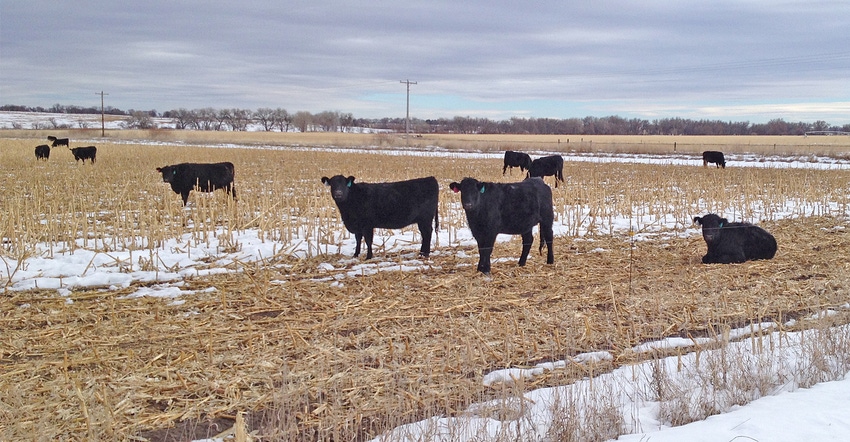Cattle do well grazing cornstalks in many situations but do benefit from a little help. There are a lot of environmental and management challenges that provide a good argument for supplementation.
November 7, 2017

Sponsored Content
It’s November in the heartland and corn harvest has been in full swing. Grazing corn residue, or commonly just called, “grazing cornstalks,” is commonplace where cows and cornfields coexist. In some parts of the Midwest, cornstalks are a winter pasture for a great number of cows. It’s not uncommon for this season of grazing to last as many as 5 months, some cows even spend calving season in cornfields. This forage resource is abundant and relatively low cost, and a good fit for diversified crop/livestock producers. Cattle do well grazing this resource but do benefit from a little help.
Nutritionally speaking, corn residue isn’t too bad, up to a point. Cows will select for the highest quality, most digestible components first; wasted grain corn, husks, leaves, and then finally the stem. A good rule of thumb is that about 50% of the corn residue can be utilized for grazing. Protein and energy provided by corn residue grazing is, however, just borderline once the waste corn is consumed which occurs very quickly in the grazing period. Additionally, the residue quality decreases steadily through the winter, especially in wet conditions. So, supplement strategies can and do make a lot of sense.
Is supplementation necessary? Maybe not, but it still makes sense
There are a lot of cows that simply get turned onto cornstalks in the fall and winter with the understanding that the feed available is good enough. This concept is supported by a University of Nebraska five-year study showing no significant findings in reproductive efficiency or fetal programming effect, and only slight improvement in cow body condition when supplementing protein while grazing cornstalks (2012 Nebraska Beef Cattle Report). This is one of those studies that seems to clash with a lot of other good data suggesting or expecting better results from such a supplement strategy on low quality forages. Under ideal conditions, healthy cattle in good body condition and mineral status, and managed to have fresh cornstalks available should probably do fine, but possibly not to their potential. This takes good management and access to an adequate number of acres. For a lot of producers, ideal conditions may not exist. Additionally, cows in the Nebraska study were removed from cornstalk grazing approximately one month prior to calving.
How supplementation can help when grazing cornstalks
On paper, cows need supplemental protein when living on a diet of corn residue. The cow selects the best components first therefore the quality of the diet is on a steady decline. Most spring calving cows will be on stalks during 2nd and 3rd trimester of gestation. Their nutrient requirements are climbing, not staying the same. This need combined with decreasing quality of forage only justifies protein supplementation to maintain what we hope is adequate body condition.
A good mineral and vitamin program is necessary too. Regardless of the protein supplement argument, fetal programming benefits have been shown from mineral supplementation as well. Cows grazing cornstalks don’t always have the best of weather protection in storms, cold, and wind. These conditions can put cows at risk of declining body condition and negative performance issues beginning with calving season. Snow cover can be a factor too, as cows may need to work harder to get to the residue on the ground after a storm.
In summary, there are a lot of good reasons to use self-fed supplementation in cornstalk grazing. Even if some data finds only minor benefits to supplementation, there are still a lot of environmental and management challenges that provide a good argument for supplementation. Choosing self-fed supplements over simply feeding hay or a commodity makes a lot of sense too. Many acres of cornstalks are rented and managed by someone who is not necessarily on site or who lives nearby, thus labor issues become a factor. Having a self-fed supplement available 24-7 and not having to drive pickups, tractors, or other equipment through corn fields and across frozen furrows to deliver hand fed supplement or commodities is a practical advantage.
Consider all the advantages of a self-fed supplemental feeding program when grazing cornstalks and consider using any of the CRYSTALYX® Brand Supplements protein and mineral formulas. You’ll realize the benefits regarding cost per head per day, labor, time management and having all your supplement in one delivery package.
About the Author(s)
You May Also Like



